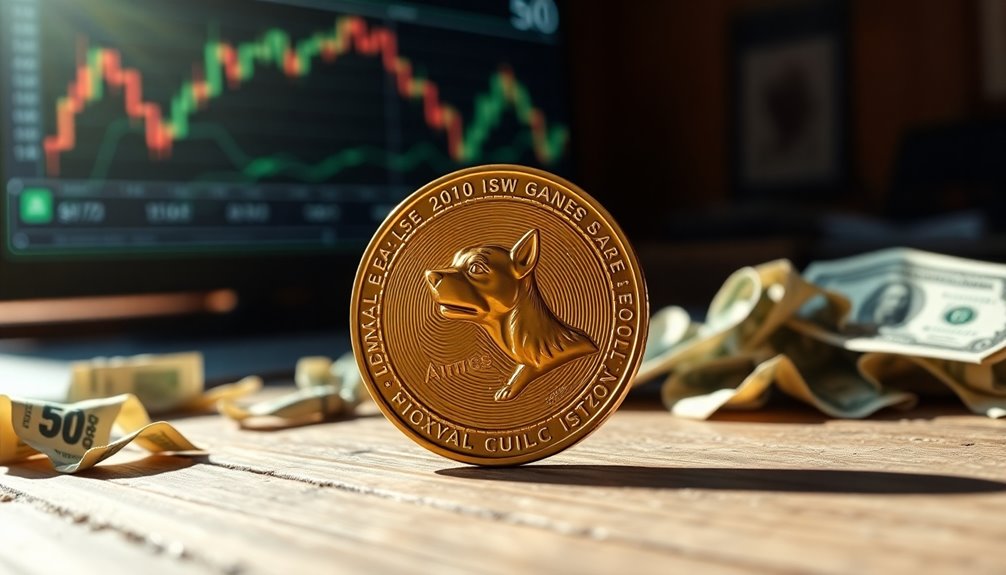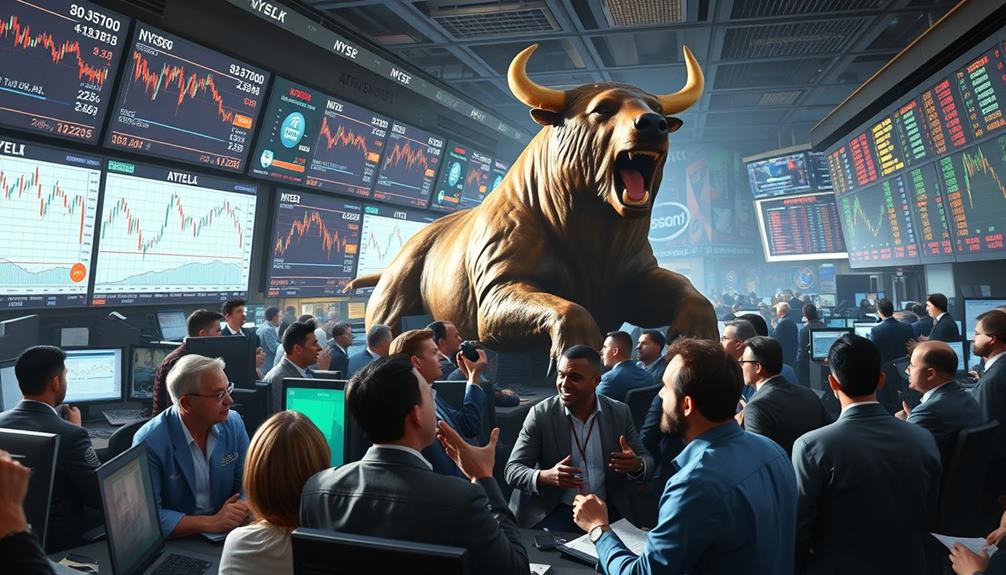You might notice a trend where institutions and whales are ramping up their DeFi token positions on Ethereum. This shift reflects a growing confidence in decentralized finance as major players, like Galaxy Digital, withdraw significant amounts from exchanges. Whale transactions have surged, indicating increased buying activity and reduced token supply, which often hints at rising prices. As these large investors accumulate tokens like UNI and AAVE, it can inspire smaller investors to follow suit. Discovering the nuances behind these movements could reveal even more about the evolving DeFi landscape and what it means for you.
Key Takeaways
- Institutional players are actively withdrawing DeFi tokens like UNI and AAVE, indicating a shift towards self-custody and confidence in the market.
- Whale accumulation of Ethereum and DeFi tokens has surged, with over 3,100 transactions recorded, signaling bullish market sentiment.
- Increased whale activity often leads to reduced token supply on exchanges, driving prices upward and enhancing market stability.
- The rise in whale transactions may inspire smaller investors, leading to increased governance participation in DeFi protocols.
- Ongoing regulatory challenges necessitate clear frameworks, as institutional interest in DeFi grows and market dynamics evolve.
Institutional Accumulation Trends
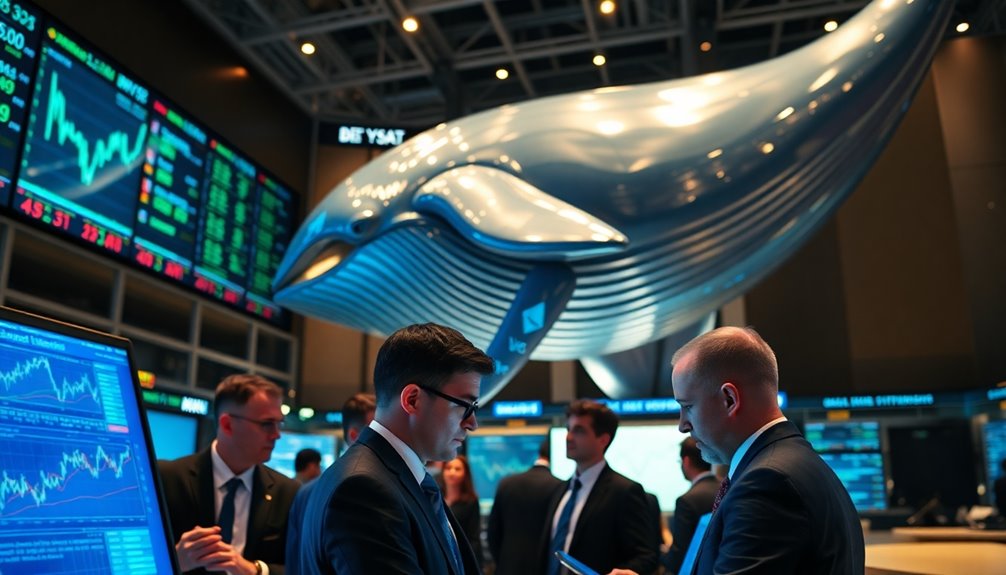
Institutional accumulation trends are reshaping the landscape of DeFi tokens on Ethereum, as significant withdrawals from exchanges signal a strategic pivot towards self-custody. For instance, Galaxy Digital recently withdrew 1.07 million UNI tokens and 27,722 AAVE tokens from major exchanges like Coinbase and Binance, indicating a strong belief in the long-term value of these assets. This shift not only minimizes exposure to exchange risks but also reduces the available supply on exchanges, which can create upward pressure on prices. Additionally, the removal of large quantities of these tokens reflects growing confidence in the decentralized finance sector.
You might notice that whale wallets are also actively accumulating Ethereum and DeFi tokens, despite recent price dips. These large investors can stabilize prices in the short term, but their ongoing demand may lead to long-term gains. As smaller investors often mirror whale activity, their confidence in the market can grow, further enhancing price stability.
The current market dynamics reflect a short-term slump, yet the sustained institutional and whale accumulation hints at a potential rebound. With institutions driving significant capital inflows into DeFi projects, the landscape is evolving, making these tokens increasingly attractive in the face of shifting market conditions.
Importance of DeFi Tokens

In today's rapidly evolving financial landscape, the importance of DeFi tokens can't be overstated. These tokens enhance financial accessibility by allowing you to tap into a wide array of services like lending, borrowing, and earning interest without needing a traditional bank. If you have a smartphone and internet access, you can join the DeFi ecosystem and engage in global financial markets.
Moreover, the advanced security and transparency offered by DeFi tokens are game-changers. Utilizing blockchain technology, these tokens ensure that every transaction is recorded on a public ledger, making fraud nearly impossible. Smart contracts automate processes, reducing reliance on intermediaries and enhancing trust within the system. This transparency is essential for enhanced trust among users in the DeFi space.
DeFi tokens also empower you through governance features. By holding these tokens, you can participate in decision-making, influencing the project's future and fostering community-driven governance. This democratization reduces centralized control and promotes a sense of ownership among participants.
Finally, the innovative spirit of DeFi tokens fosters market liquidity. They create opportunities for yield farming and diverse investment strategies, redefining financial services and extending their reach beyond traditional offerings. Embracing DeFi tokens opens doors to a more inclusive and dynamic financial world.
Market Impact of Whales
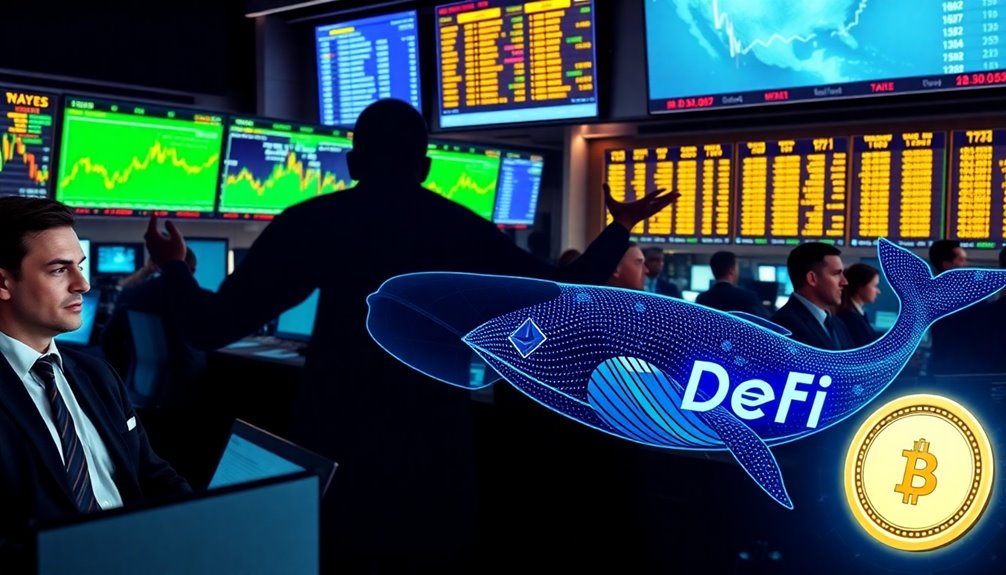
The influence of whales on the DeFi market is profound, as their actions can significantly sway prices and overall market sentiment. When institutions and whales withdraw substantial amounts of DeFi tokens like UNI and AAVE from exchanges, it creates a noticeable impact. For instance, Galaxy Digital's withdrawal of 1.07 million UNI tokens and 27,722 AAVE tokens reduces the available supply on exchanges, which can drive prices upward due to scarcity.
As a smaller investor, you might notice that whale activities often inspire confidence, prompting you to mirror their moves. This accumulation can initially stabilize prices but tends to drive higher demand and prices over time. Moreover, when whales accumulate Ethereum, it decreases the circulating supply, putting upward pressure on ETH's price. Their substantial staking of ETH also locks up supply, enhancing network security and creating bullish predictions for its future. Additionally, the recent trend of whales reallocating their holdings to alternative DeFi blockchains indicates a shift in their investment strategies.
Ultimately, the actions of whales act as catalysts for broader market movements. With their increasing involvement, you can expect heightened market participation and sentiment shifts, reinforcing Ethereum's role as a pivotal platform in the DeFi landscape.
Ethereum's Role in DeFi

Ethereum plays a pivotal role in the DeFi ecosystem, hosting over 70% of DeFi projects and enabling a diverse range of decentralized financial services. Its smart contract functionality is the backbone of DeFi, allowing for automated, transparent, and trustless transactions. Most notable projects like Aave, Uniswap, and Synthetix are built on this blockchain, showcasing its versatility. The scalability challenges faced by Ethereum are being addressed through ongoing innovations and upgrades, ensuring the network can support even more DeFi activity in the future.
The decentralized lending and borrowing platforms, along with decentralized exchanges (DEXs), allow you to trade cryptocurrencies without intermediaries. Automated market makers (AMMs) like Uniswap streamline price discovery through mathematical formulas, creating a more efficient trading environment. You can access innovative financial products, such as synthetic assets, which promote financial inclusion for anyone with an internet connection.
While Ethereum faces scalability challenges and high gas fees, solutions like Ethereum 2.0 and Layer 2 networks are on the horizon. These upgrades aim to enhance transaction efficiency and overall network performance. With its first-mover advantage and institutional interest, Ethereum remains a dominant force in the DeFi space, continually attracting investments and fostering innovation across its ecosystem.
Regulatory Environment for DeFi

Navigating the regulatory environment for DeFi can feel like walking through a maze, with a lack of clear frameworks creating uncertainty that hinders mainstream adoption. The regulatory landscape varies significantly across jurisdictions, complicating things for DeFi projects. You may find it challenging to determine which regulations apply due to the decentralized and borderless nature of the space. There's an urgent need for clear and comprehensive guidelines to help you navigate this complex environment.
Compliance presents its own set of challenges. Anti-Money Laundering (AML) compliance can be tough to implement in decentralized settings, making Know Your Customer (KYC) measures essential yet difficult. Regular legal audits are crucial to ensure adherence to the latest regulations, including consumer protection laws. Ignoring these can lead to severe penalties. Additionally, the growing interest in DeFi from institutional investors highlights the importance of establishing robust regulatory frameworks that can accommodate both innovation and safety.
Different jurisdictions adopt various regulatory approaches, often citing concerns like money laundering and financial stability. International organizations suggest principles such as "same activity, same risk, same regulation" to guide DeFi regulation. Strengthening public-private sector dialogue could help regulatory authorities better manage DeFi's unique challenges, ultimately fostering a safer environment for all users.
Recent Whale Activity Insights
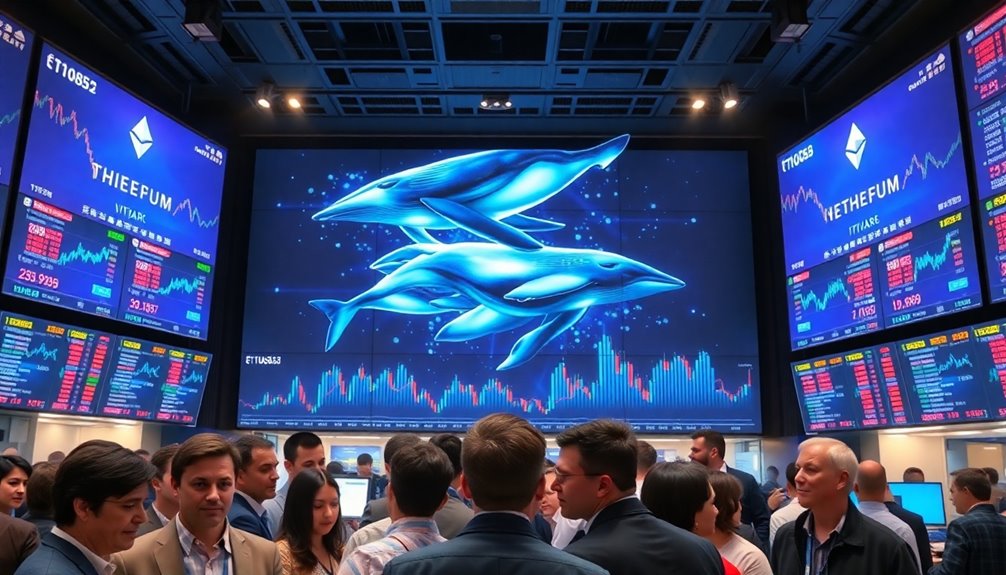
With the regulatory landscape for DeFi evolving, whale activity has emerged as a critical factor in the market's dynamics. Recently, Galaxy Digital made headlines by withdrawing 1.07 million UNI tokens and 27,722 AAVE tokens, showcasing their confidence in long-term value. These withdrawals, worth nearly $29 million combined, were moved to self-custody wallets from major exchanges like Coinbase and Binance, signaling a strategic shift.
In just the past week, Ethereum whales engaged in transactions totaling over $74 billion, with net flows reaching $781 million. The spike in whale transactions, particularly for AAVE, demonstrates increased momentum, as over 3,100 transactions were recorded—the most significant activity since 2022. This surge includes 3,310 transactions exceeding $100,000, highlighting a robust interest.
Such high whale activity is often a bullish sign, correlating with price increases and heightened market sentiment. As large investors continue to engage, smaller traders might mirror these moves, bolstering confidence across the board. Moreover, these significant token movements could influence governance decisions within DeFi protocols, potentially setting the stage for future developments. Additionally, the accumulation of Ethereum-based tokens reinforces the foundational role that Ethereum plays in the DeFi ecosystem. Overall, the recent whale activity indicates a transformative phase for the cryptocurrency market.
Frequently Asked Questions
What Are the Risks Associated With Investing in Defi Tokens?
Investing in DeFi tokens comes with several risks you should consider. There's the potential for coding errors in smart contracts, leading to losses if exploited by hackers. Regulatory changes can introduce uncertainty, impacting the legality of your investments. Market volatility can cause rapid price fluctuations, while liquidity issues may exacerbate losses. Additionally, you face token-specific risks, including rug-pulls and counterparty risks due to the absence of intermediaries. Always do your research before diving in.
How Can Individuals Participate in Defi Investment Strategies?
You can participate in DeFi investment strategies by exploring options like staking, yield farming, or directly investing in DeFi tokens. Start by choosing a compatible wallet that supports various tokens and offers strong security. Diversify your investments to minimize risks, and monitor the market regularly to adapt your strategies. Don't forget to do your own research and consult experts to make informed decisions and protect your investments effectively.
What Factors Influence the Price of UNI and AAVE Tokens?
The price of UNI and AAVE tokens is influenced by several factors. Market demand and adoption play a crucial role, as increased usage of DeFi protocols boosts token value. Positive news and overall market sentiment can drive prices up, while negative events might cause declines. Competition among decentralized exchanges affects market share, and regulatory changes can either bolster or hinder token prices. Lastly, macroeconomic factors can lead to shifts in demand for cryptocurrencies. Furthermore, the activities of crypto firms and mica regulations contribute significantly to the price dynamics of UNI and AAVE. As these regulations evolve, they can either instill confidence among investors or create uncertainty, thereby impacting trading volumes and market engagement. Additionally, the strategic moves made by crypto firms, such as partnerships or product innovations, can generate significant buzz and influence token valuations.
Are There Any Security Concerns With Self-Custody Wallets?
Yes, there are security concerns with self-custody wallets. If you lose your device or forget your recovery phrase, you could permanently lose access to your assets. Browser-based wallets may also be vulnerable to hacks, and without insurance, you're on your own if something goes wrong. It's crucial to keep your private keys secure and to implement measures like two-factor authentication to enhance your wallet's security. Always back up your wallet properly.
How Do Regulatory Changes Affect Defi Project Developments?
Regulatory changes significantly impact DeFi project developments. You'll notice that increased enforcement actions force projects to prioritize compliance, which can slow innovation. As regulators tighten rules around AML/CFT obligations, you might see DeFi platforms adopting stricter controls, affecting user experience. Additionally, new definitions could redefine how you interact with decentralized exchanges. Ultimately, these shifts may lead to a more secure environment but could stifle the rapid growth and experimentation that DeFi thrives on.
Conclusion
In conclusion, the growing interest from institutions and whales in DeFi tokens on Ethereum signals a significant shift in the market landscape. Their strategic accumulation not only highlights the importance of these tokens but also underscores Ethereum's pivotal role in the DeFi ecosystem. As you keep an eye on these developments, it's crucial to stay informed about the regulatory environment and recent whale activity, as they can greatly impact your investment decisions in this dynamic space.



